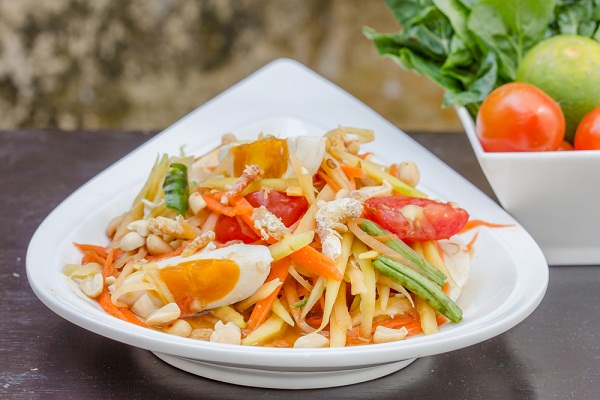Traveling to foreign lands with new terrains to experience a country’s native and vibrant cultures is what makes the trip worthwhile going for. Sometimes, however, the language barrier can become an obstacle, especially if the country’s native language does not feature any English alphabets and words. While traveling to a new country may also seem daunting to some, there is a way to get around comfortably; one of the recommended tips is to get your hands on a language phrasebook to help get ready for a fantastic vacation. While a majority of Thai tourist-oriented cities feature many signs in English, and the populace speaks English (to a certain extent), it is great to know locally used phrases as well. While your pronunciation may not be the best, the locals will nonetheless understand what you’re trying to say.
Below, is a post to help you get familiar with the most commonly spoken words and phrases in Thailand and how to appropriately use them.
One of the most important things tourists should know is the critical difference between words spoken for men and women. For men (in general), the correct way to address oneself is using the term “phom”, while Thai women use “chan”, that translates to “I” in English. For conversations with people, it is polite to add “krub” (for men) or “kha” (for women) at the end of each sentence. Apart from our universal language, our gestures, you can always add a smile and say “Sawasdee” (Hello) whenever you want to greet someone. Saying “Sawasdee” will be a helpful icebreaker especially to Thai people who are not familiar with “Farang” (foreign tourists).

If you plan on traveling around, one of the most convenient ways to travel in Bangkok is by utilizing the BTS (sky train) and MRT (subway) which provide instructions and signs in English. However, if you want you're traversing a bit easier, take a taxi. You can ask the driver, “Phood Pasa Angkrit Dai Mai” (Can you speak English?). If you continue to repeat this sentence, and he responds by shaking his head saying “Mai Khao Jai” (I don’t understand), you can tell him where you want to go by saying, “Yark Pai Tii + your desired place” (I want to go to + your desired place). If he still does not understand you, it is best to pull out a map and point to the location you want to go. Alternatively, if you have a smartphone, open a maps application and show him. Once you have reached your desired location, you can always thank the driver by saying, “Khob Khun krub/kha” (Thank you).
Other useful phrases to learn are phrases to use when visiting a restaurant. For example, if you are currently residing at your beachfront hotel, and you want to know where you can grab a bite, you can ask your concierge, “Nae Num Raan Arharn Taew Ni Hai Noi” (Can you recommend some restaurants around here?). If you want to try street food, you can substitute “Raan Arharn” (restaurant) with “Arharn” (food). At the restaurant when you have taken a seat, you can request the English menu by saying, “Mee Maynuu Pasa Angkrit Mai” (Do you have an English menu?). Additionally, Thai cuisine is well-known for a variety of ingredients and features a spectrum of tantalizing flavor, derived from herbs and spices and local produce. However, if you are allergic to certain food items, you are required to inform the waiter/waitress that you are allergic by saying, “Phom/Chan Phae + allergen” (I’m allergic to + allergen). The most common types of food allergies foreigners are most prone to are: “Gung” (shrimp), “Arharn Talay” (seafood), “Thua” (peanut), and “Nom” (milk). By knowing these useful terms, you can ensure your meal will be prepared and cooked properly without any dangerous allergens.
For people concerned about their health, you can kindly request the waiter or waitress to communicate to the kitchen to not add in MSG or chili; “Mai Sai Phong Chu Ros” (Please do not add MSG) or “Mai Sai Prik” (Please do not add chili). If you want to challenge yourself against a spicy dish, you can tell the waiter or waitress, “Sai Prik Yer Yer” (Please add lots of chilies) or you can play safe and say, “Sai Prik Noi Noi” (Please add a little bit of chili). For vegan lovers, you can ask, “Mee Maynuu Jae Mai” (Do you have a vegetarian menu?). Once you have finished your meal, it is time to get the bill. Gesture your waiters or waitress and tell them, “Keb Ngern” (Bill, please).

When going shopping in markets or malls, there are useful phrases you can say such as, “Raka Taorai” or “Khii Bath” (How much?). If you believe the price is too high for your taste; bargain it out. You can say, “Lod Hai Noi Dai Mai” (Can I have a discount?). In case the seller refuses to lower the price, you can politely say, “Mai Aow” (I do not want it) and walk away.
Other useful phrases to know are, “Khob Khun Mak” (Thank you very much), which is the superlative of Thank You, “Kor Thod” (Sorry or Excuse me), and “Mai Pen Rai” (It’s ok, Never mind, or You’re welcome).
Using new Thai phrases may be challenging. However, once you get used to it, it will make your vacation in Thailand that much more pleasant and hassle-free.


